One of the most important aspects in the survival and growth of cryptocurrencies and their usability is the formation of circular economies. We have seen these pop up at small scale within Bitcoin and other cryptocurrencies, but Monero has multiple attributes that uniquely enable us to build and participate circular economies.
This is a blog post form of the presentation I original gave at Monerotopia in April of 2022. For the original video, please see below:
For access to the slides of this and all other presentations I have given publicly, please see below:
What are circular and parallel economies?
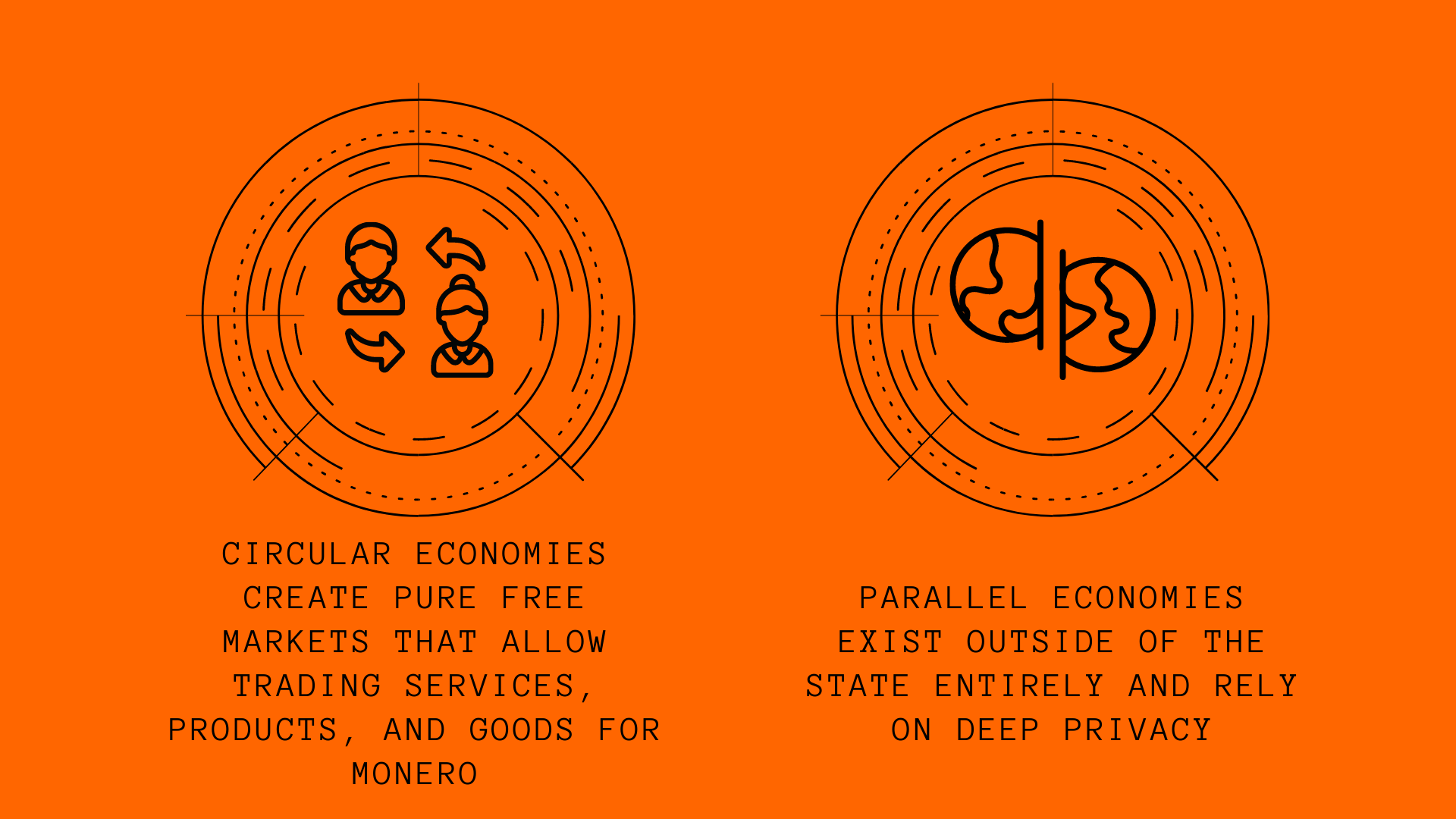
While I’m sure you all are loosely familiar with economies as a broad topic, the idea of a “circular economy” is one that is rarely discussed outside of the cryptocurrency world. What makes circular economies so important and special are that they create truly free markets that allow the trading of services, products, and goods directly for Monero.
Participants don’t need to constantly be moving in and out of fiat, but can keep their Monero within the system, earning, saving, and spending directly in Monero without the friction, surveillance, or restrictions of the normal economy.
Circular economies are generally completely “above board” and legal, but function more as “grey markets” compared to the normal “white markets” in the fiat world.
Parallel economies, on the other hand, are what could also be called “black markets”, and exist solely outside of the purview of the state. These markets are pure free markets, and can only exist if they embrace privacy-preserving technologies fully. While they are often most well known for illicit items and contraband, parallel economies have also been the lifeline for citizens in oppressive regimes, broken economies, and other scenarios where the white and grey markets are unable to sustain a solid life.
Why do we need to build circular and parallel economies?
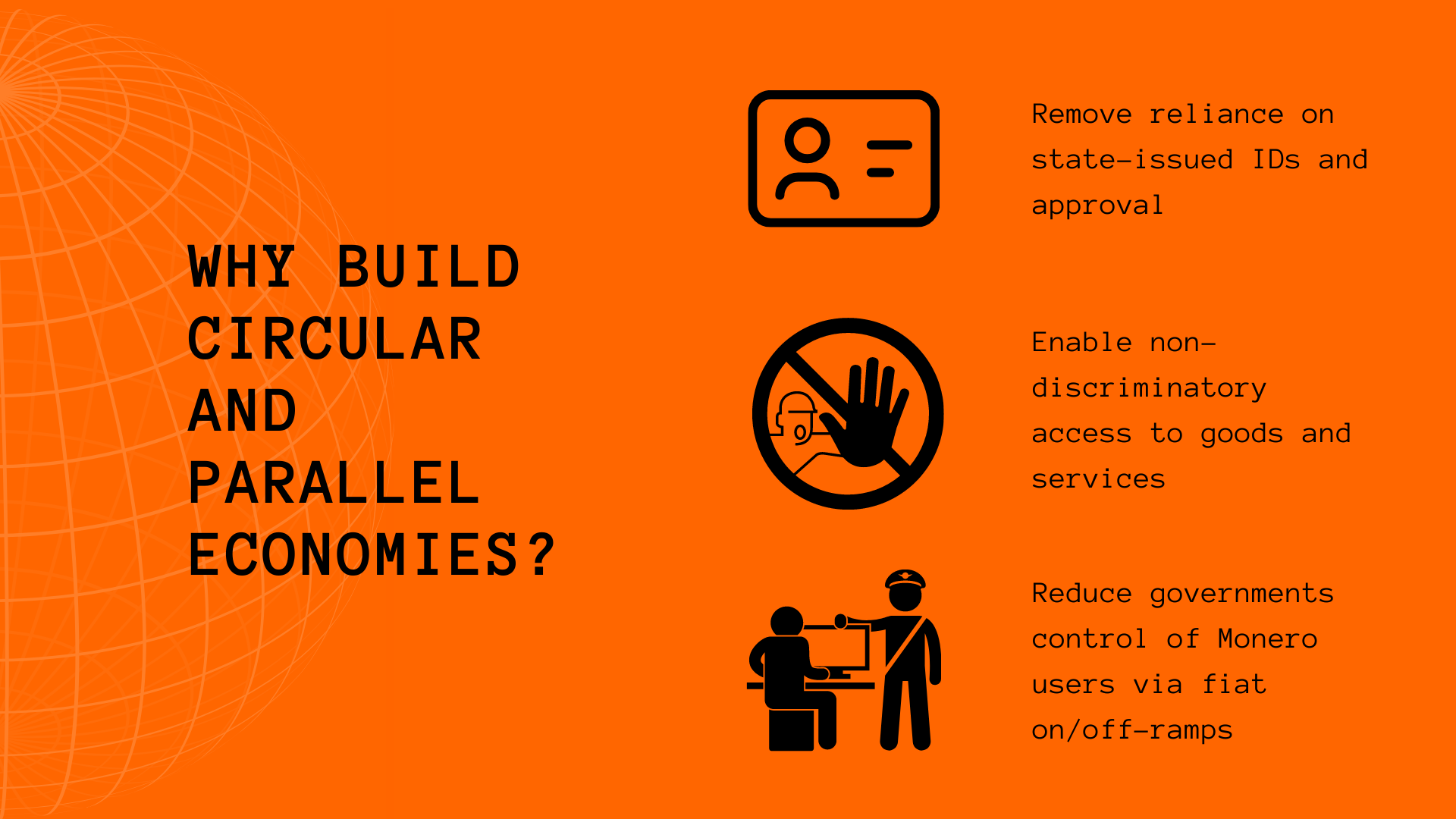
1. Remove the reliance on the state’s approval and ID system
This point may not stand out to most westerners or people who have lived with the ID system in a stable country, but our reliance on state-issued IDs and approval in order to conduct business, earn a living, and buy what we need to survive enables the state to easily cut off those they deem “non-compliant”.
This is not just criminals, and can be political dissidents, religious minorities, racial minorities, etc. This control lets the state dictate who can and cannot engage in commerce, who each of us can transact with, and what we can buy/sell – essentially choosing life or death for each citizen based on compliance.
Removing this reliance by building circular economies removes the states power over our ability to engage in an economy, letting us survive and thrive no matter what the state thinks of us.
2. Reduce the governments control of Monero and Monero users via fiat on/off-ramps
The incredibly strong privacy guarantees and decentralization of Monero make it extremely difficult (or even impossible) to prevent people from using it how they see fit. Because of the strong technical base for Monero’s power as a tool for freedom, governments are rapidly realizing their best chance of controlling Monero users or reducing the effectiveness of the network is to control who can get access to Monero while compiling a nice and tidy list of Monero users via Know-Your-Customer (KYC) exchanges.
When we build out circular economies we do not need to use fiat on/off-ramps as frequently (or even at all!), and so can remove that point of government control over our actions.
We can also do this by refusing to use centralized KYC exchanges, and trading peer-to-peer here on LocalMonero.
How does Monero uniquely enable these circular economies?
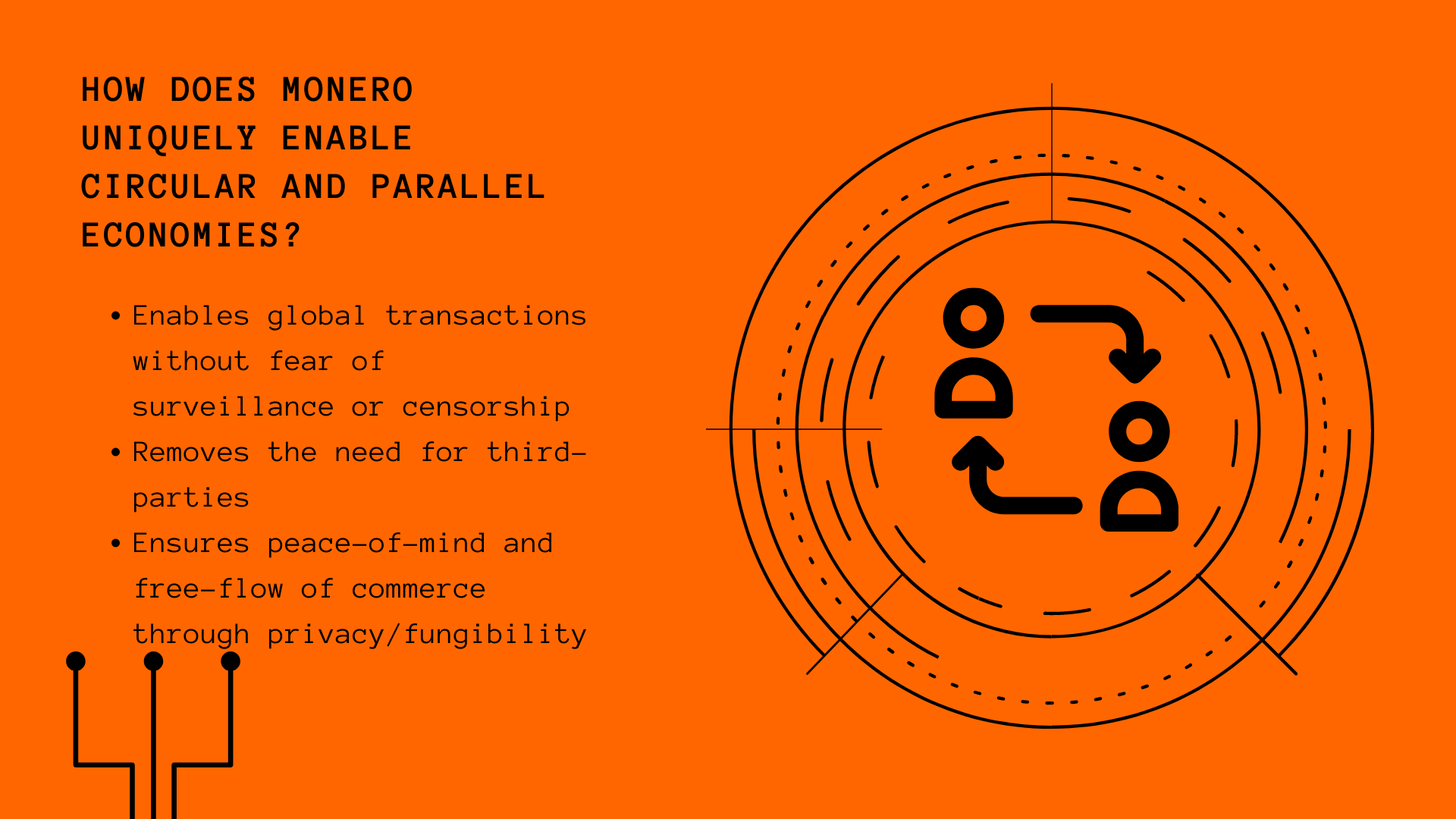
While Monero shares some of the core attributes of Bitcoin that enable circular economies in a new way (censorship-resistant payments, p2p transactions, etc.), it brings an absolutely unique empowerment to those wishing to build and engage in circular economies.
1. Monero enables global p2p transactions without fear of surveillance or censorship
Monero users do not need to worry about mass surveillance or even targeted censorship of their transactions, enabling unique peace of mind and preventing any burdens on commerce. You can transact with anyone in the world, at any time, without any surveillance using the Monero wallet of your choice.
2. Fungibility removes the risk of tainted coins and ensures trust
As Monero is fungible (1 XMR equals 1 XMR, no matter what), participants in the circular economy don’t need to worry about the funds they are sending or receiving. Any Monero they send cannot be traced back to their other transactions and has no history and thus cannot be censored based on history, and Monero received will always be able to be spent freely at full market value. This fungibility adds to the peace of mind of participants, ensures that chain analysis firms cannot force their way into circular economies, and prevents a breakdown of trust in Monero as a method of exchange.
The current breakdown of trust in Bitcoin as a method of exchange is leading to it rapidly losing traction in circular economies where Monero is present. People don’t want to have to check funds for taint, worry about if they will be able to spend them freely, or feel the need to use any chain analysis tools to protect themselves from legal or regulatory issues.
3. Monero’s low fees ensure a free flow of commerce
One of the simplest points to grasp about Monero transactions is that transaction fees are incredibly low and will remain reasonable in the long-term thanks to the tail emission and dynamic block size.
These low fees make sure that commerce can flow freely no matter the amount of blockchain congestion, further reducing the mental burden and stress on participants to try and time their transactions or wait hours/days to confirm low-fee transactions. With fees around 1c today, you can transact freely with any size of transaction without worry about fees down the line.
How can privacy tools be key to building circular and parallel economies around Monero?
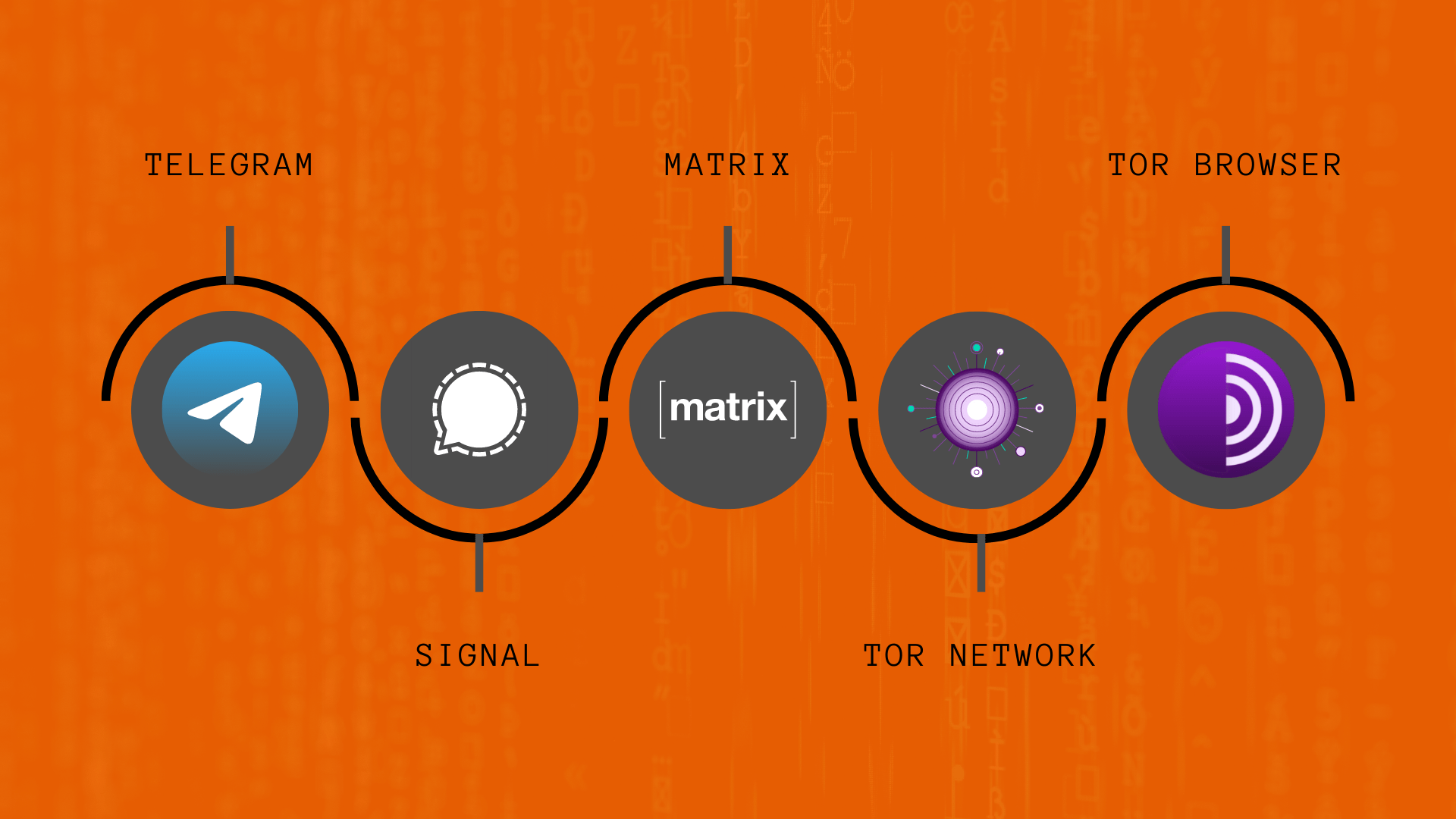
While Monero is an extremely powerful tool for financial freedom, it only covers the financial privacy and accessibility necessary to build these alternate economies. Thankfully, there are excellent tools out there that can be paired with Monero to help drive these economies forward with or without the approval of governments of nation-states.
Telegram: A useful bridge
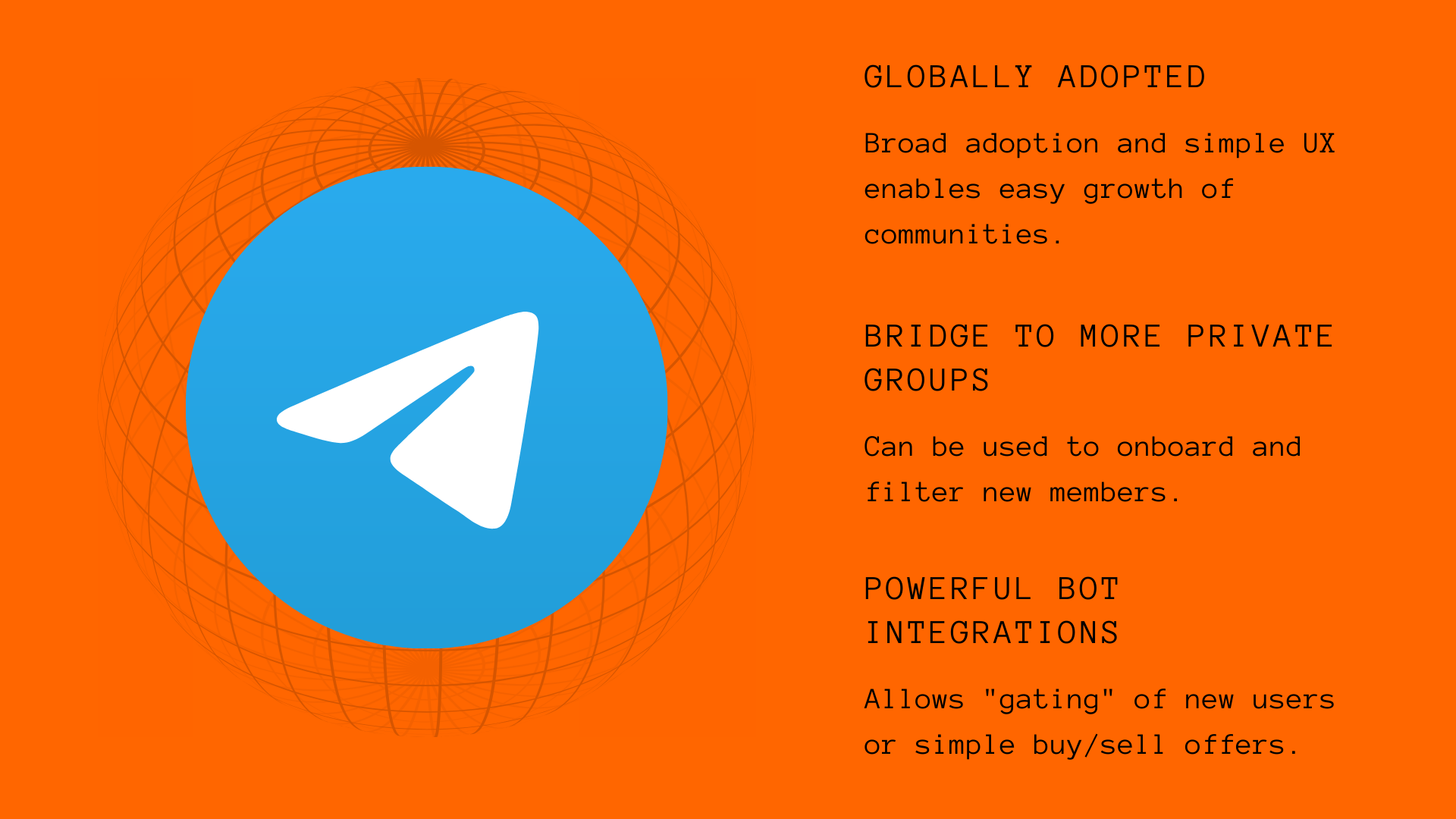
While you may not think of Telegram as a “privacy tool” due to it’s lack of strong default privacy and it’s centralization, it’s broad adoption and powerful bots can make it an extremely useful bridge to the broader circular and parallel economies. It already has extremely broad adoption in cryptocurrency circles, and is a well-known and commonly used tool worldwide with more than 550 million monthly users. This user base paired with the simple UX of Telegram make it a great tool to onboard others to, get new entrants familiar with these new economies, and bridge them into more private alternatives.
Signal: Pairing user experience with default privacy
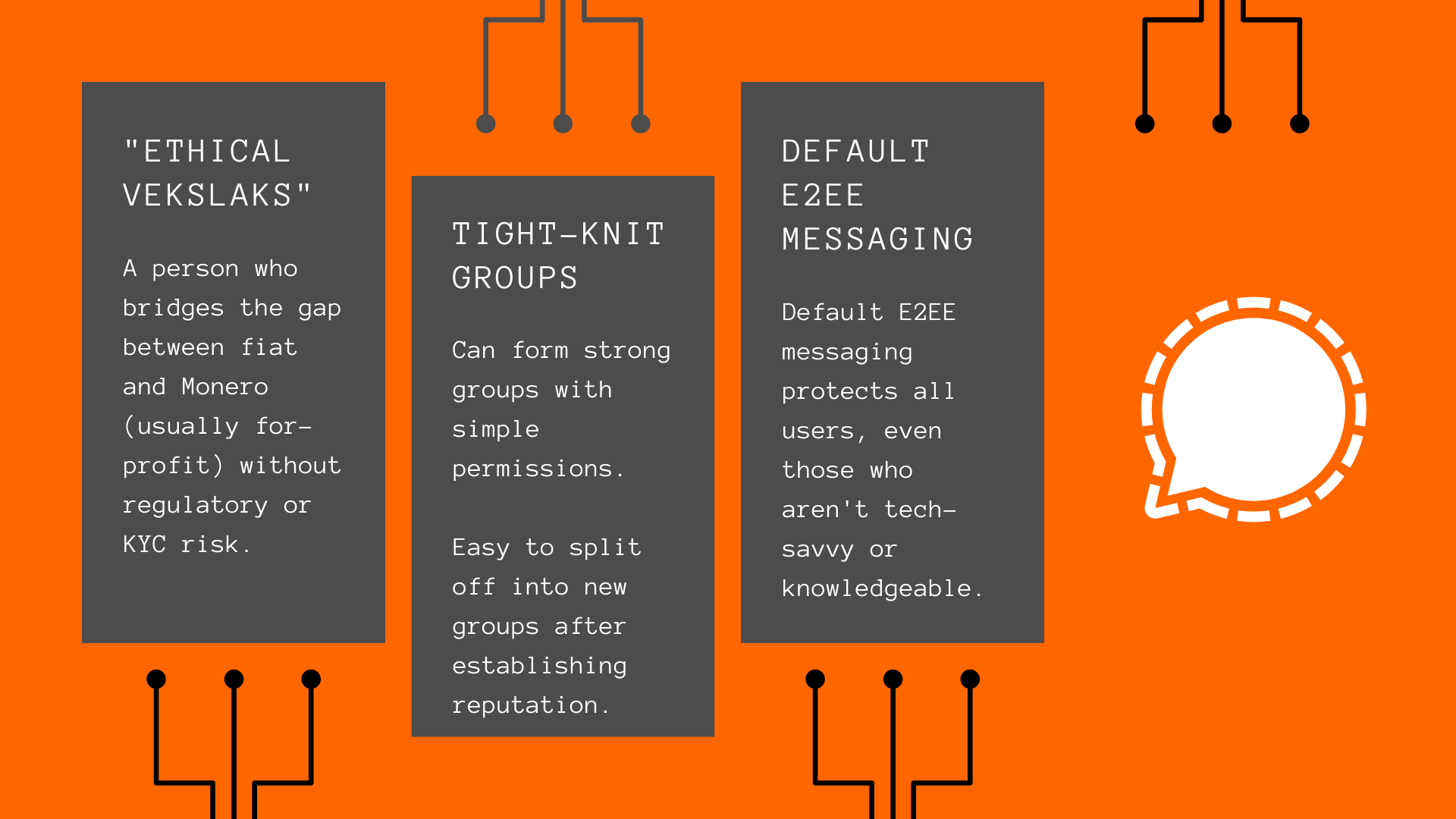
Signal is one of my favorite privacy tools, and is a no-brainer to include on this list. The strong default privacy, simple UX, and broad name recognition make it an excellent fit for those who go deeper into these new alternate economies. One of my favorite ways to use it is to become “ethical Vekslaks”, a term I learned from Juraj Bednar when I got the privilege of interviewing him on Opt Out in season 1. An ethical Vekslak is someone who steps into the gap and helps to on and off-board people to these economies by helping them exchange fiat currency for cryptocurrencies like Monero. For more on the concept, listen to the episode I did with him:
These ethical Vekslaks are going to be more and more vital as the state cracks down on “non-compliant” citizens who refuse the draconian measures imposed by KYC/AML laws, and Signal gives them an easy platform to build small, close-knit local groups on without compromising on privacy. The beauty of simple default privacy is that all participants gain strong privacy no matter how much they understand of the need for privacy.
Matrix: Federation enables decentralization
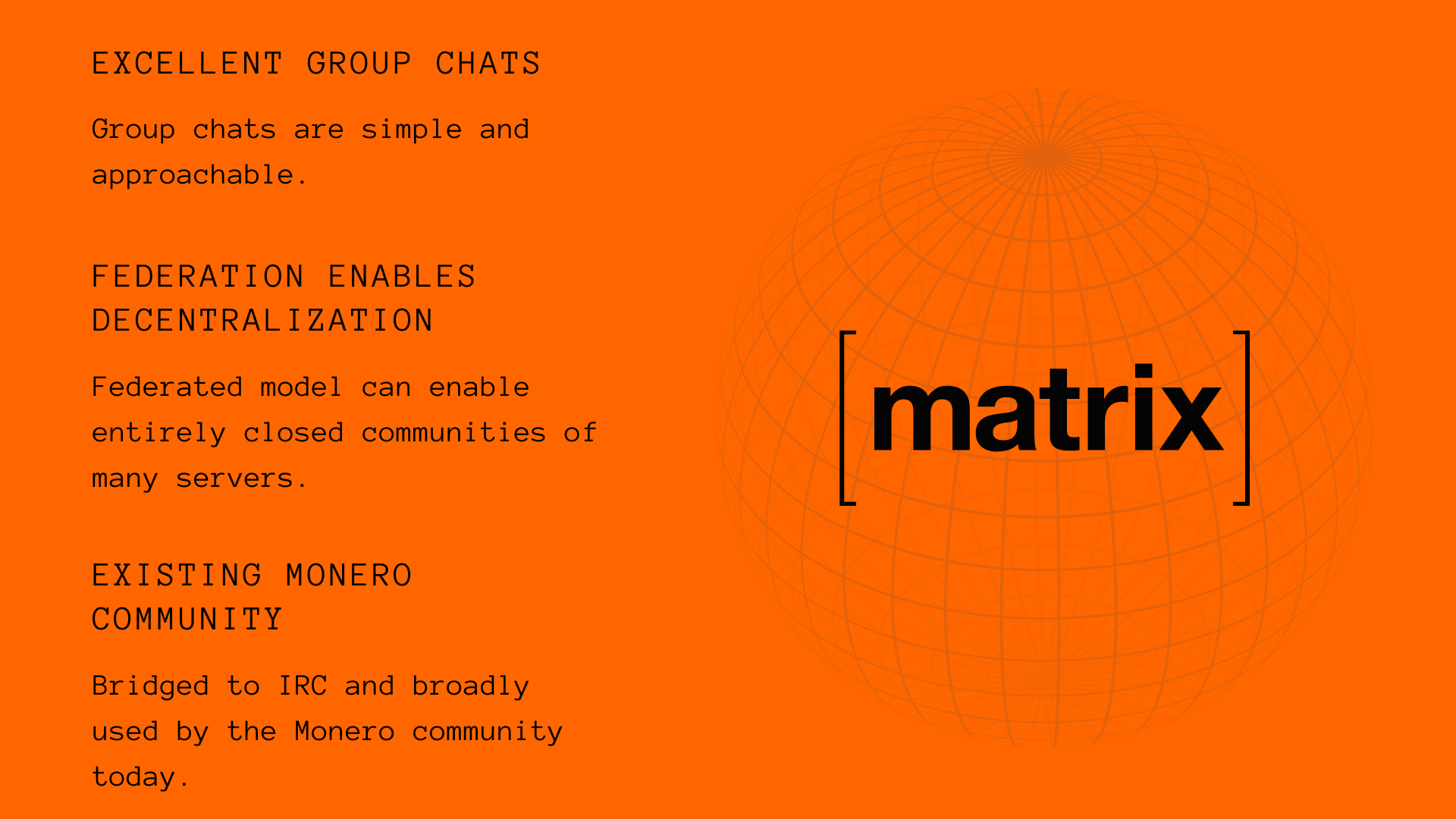
Matrix has been one of the fastest growing platforms in pro-privacy and pro-freedom circles, as the protocol’s focus on federation and decentralization makes it an extremely effective tool for building communities. While the user experience isn’t quite on par with centralized and surveilled alternatives like Discord or Slack, it’s come a long way over the last couple of years, and the open protocol means that more clients are being built around it every day.
Matrix enables easy end-to-end encryption for group chats, default e2ee for private chats, and it’s federated model enables you to build communities that are never even exposed to the broader internet. It also can be paired with Tor (the next tool on our list!) to create communities that exist entirely out of the view of the state and broader internet, a vital quality for parallel economies in particular.
Tor: Anonymity loves company
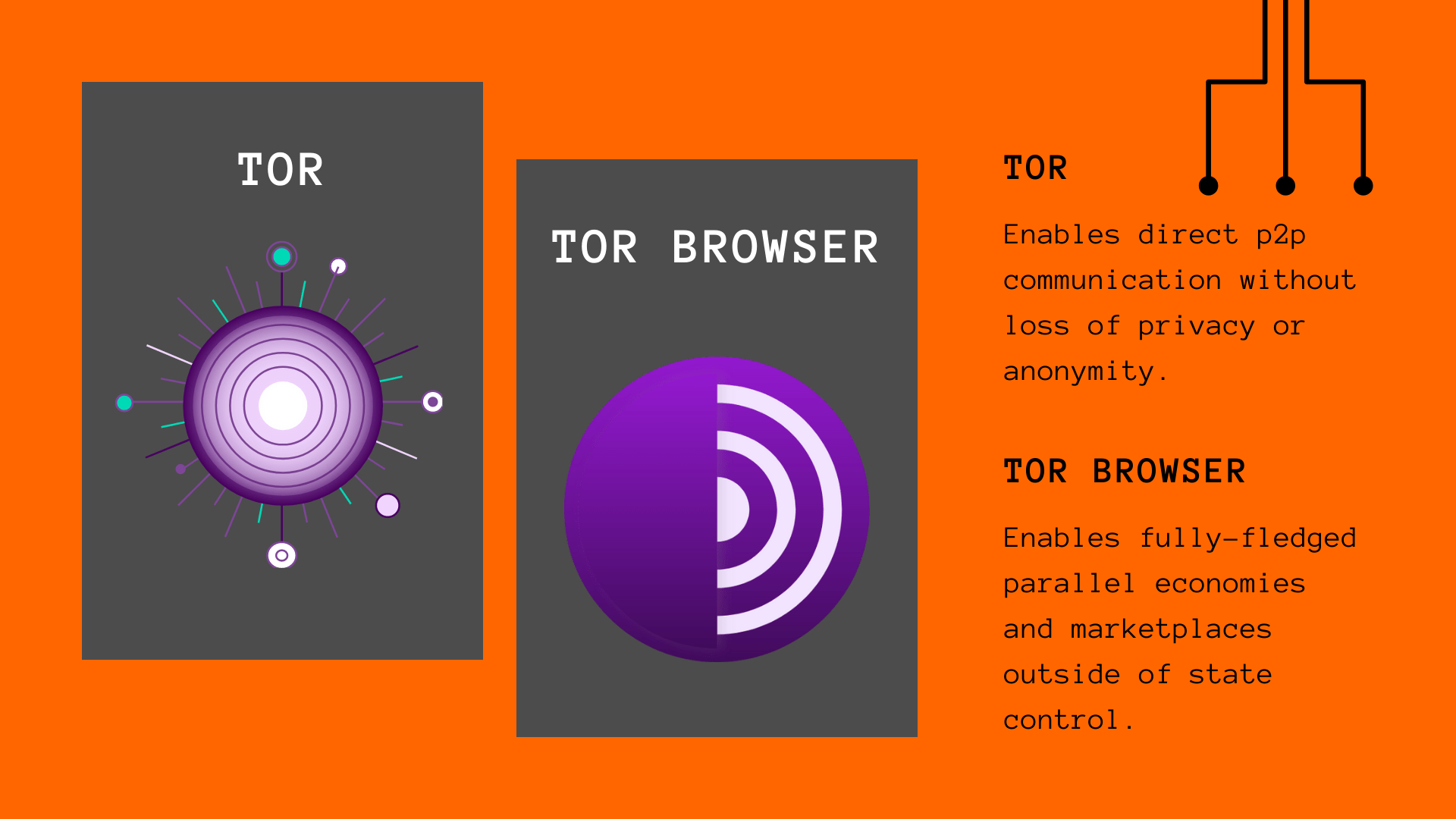
Tor and the Tor browser are probably the most well known tools on this list to die-hard privacy people, and are forming the backbone of these new economies. They enable relatively easy access to anonymity and hosted services while preserving strong user privacy, and are key building blocks of tools in these new economies like Bisq and Haveno.
While Tor is helpful for circular economies, it is absolutely essential to the survival of parallel economies and has been their basic building block for years. While dark net markets are the most well-known example, Tor has enabled pure free markets to develop and grow in spite of adversarial environments, and is an incredibly important tool as governments around the world slide towards authoritarianism.
Conclusion
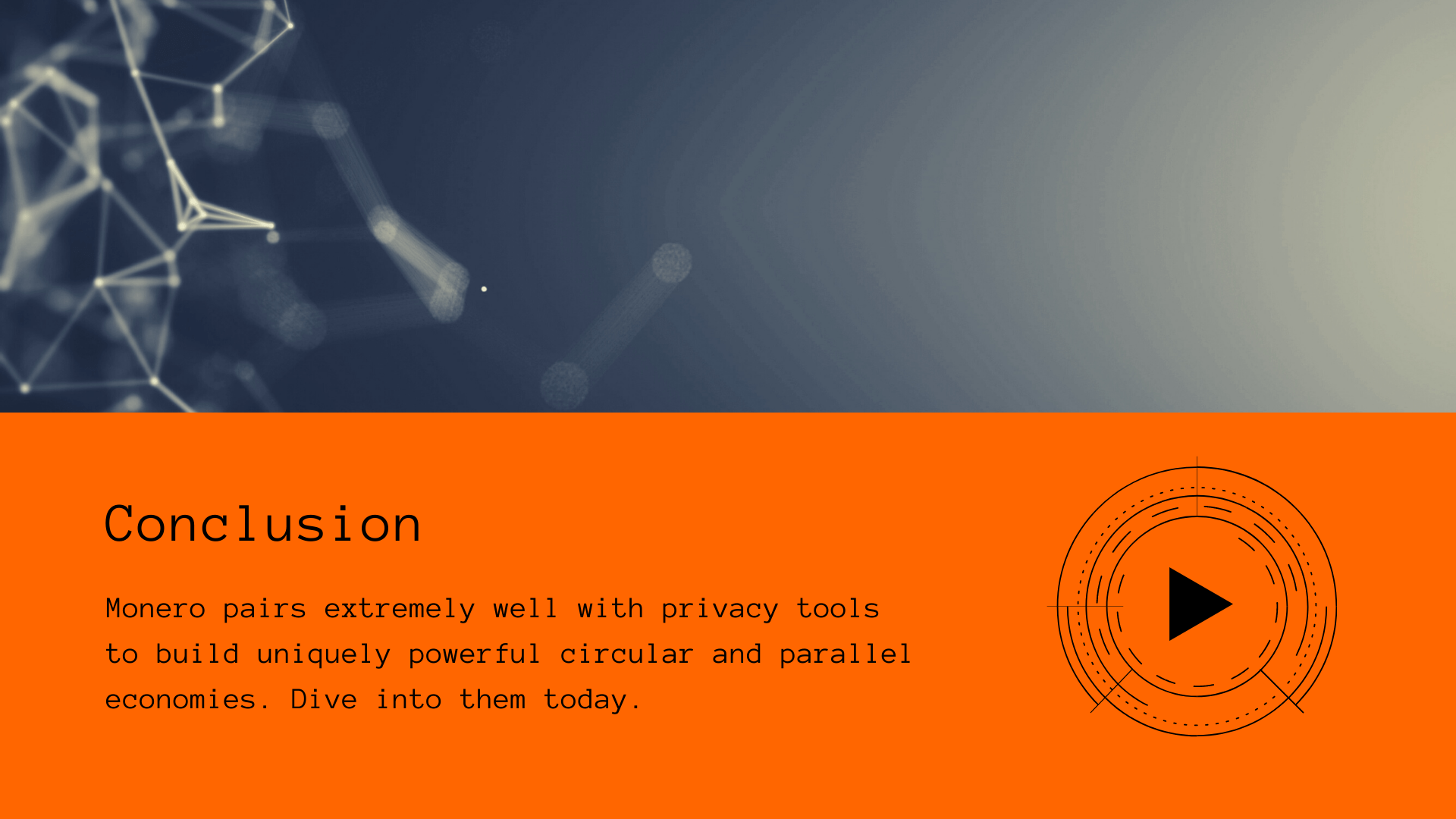
Ultimately, Monero is digital cash as it should be. The peace of mind, fungibility, and privacy of transacting in cash but with all of the advantages of digital, global, and p2p transactions detached from the states control or surveillance. This ability to act as digital cash is uniquely enabling circular economies today and helping them to grow and prosper over time in ways that other cryptocurrencies like Bitcoin simply can’t.
How can I learn more?
If you’re curious and want to better understand circular economies or start participating in one today, see the links below for great places to get started: